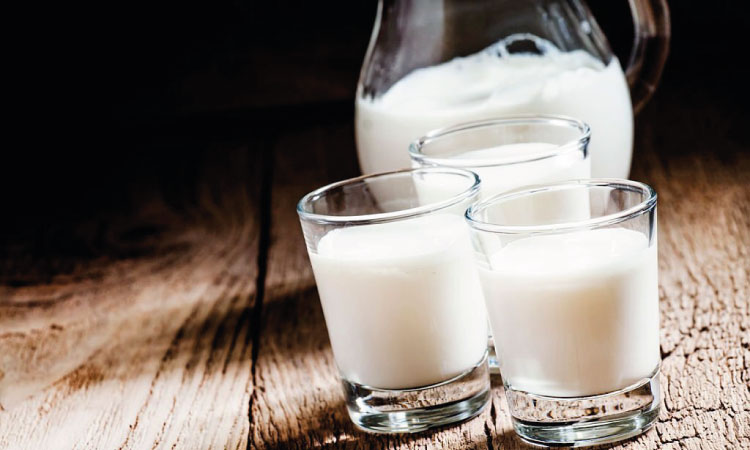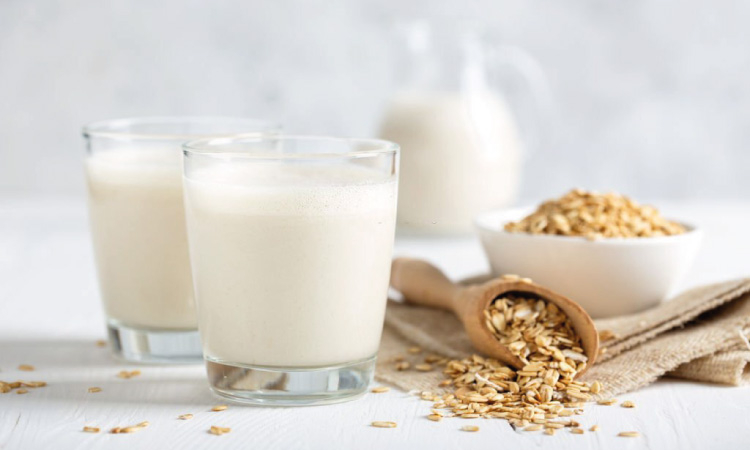Milk has been deemed as a complete food and rightly so. A child till the age of 3 years needs about 500 mg/ of calcium everyday in 2-3 servings1. Once your. child has his first birthday, the diet will need to be planned in such a way that the child gets all the necessary nutrients required for optimum growth . Questions such as ‘what milk can I offer to my child?’ Will weigh on your mind.
But somehow. Young kids and milk do not go along well. So what to give a toddler besides milk? — especially when your child starts to refuse to take cow /buffalo milk. It can be so confusing, as there are so many options out there, so many different brands, and also so many opinions for moms who prefer vegan alternatives to milk for toddlers.
Whatever said, as a mother you know the best on what to offer the child apart from breastmilk and if any alternatives to milk for toddlers is required. According to the World Health Organization (WHO), exclusive breastfeeding for babies up to six months of age is recommended. After which, a well-balanced, healthy weaning diet with continued breastfeeding for up to two years is advised2.
For moms who cannot breastfeed, the baby can have fortified infant formula. For babies with lactose intolerance or milk allergy, hypoallergenic formula is usually advised. Also, babies under 12 months should avoid cow’s milk as their digestive systems are too immature to digest it.
Related Reading: Cow Milk For Babies – Benefits, Risks, and Precautions
In this article, we will discuss what to give a toddler besides milk and about the healthy alternatives to milk for toddlers.
6 Healthy Alternatives To Milk For Toddler
Before we dive into the alternatives to milk for toddlers let us talk about why a toddler would require an alternative to milk. Once you introduce your child to cow’s milk, it is important to keep a close watch on how the child reacts to it. There are possibilities for the child to develop allergies or conditions such as lactose intolerance, diarrhea, skin rash, etc. That is why many parents go out for milk substitutes for toddlers with eczema.
Parents, in general, want their toddler’s diet to provide them with the most nutrients and benefits and hence choose healthy alternatives to milk for toddlers. Healthy babies older than one year can have whole cow’s milk as their primary drink, which is what is followed traditionally by many parents unless an exception.
Related Reading: 10 Most Important Nutrients For Children
You cannot expect all milk types to be nutritionally the same. So, how should parents decide which milk or milk alternative is suitable for their toddler?
1. Breast milk – the wholesome alternative to whole milk for toddlers
Many medical experts strongly recommend breastfeeding exclusively (no formula, juice, or water) for 6 months. Also, it is proven time and again that breast milk provides the ideal nutrition for infants. It comes with the right amount of vitamins, protein, and fat that is required for your baby to grow.
Also, breast milk is more easily digested than infant formula. It is easy for a baby to fight off viruses and bacteria with breastmilk as it contains antibodies. There is a myth that breast milk turns to water or doesn’t have nutritional value after a few months. According to a source, the nutritional content of breast milk mostly stays the same even during the second year of life.
Also, according to another source, it was found that breast milk after 1 year had higher energy and fat contents, which may be beneficial to babies.
Breast milk after six months is something that could be adjusted if desired as the baby will be transmitted to solids. There’s no upper/time limit on breast milk intake. However, if breastfeeding seems to be putting a hold on solids, you can consider decreasing the daytime sessions.
2. Goat’s milk

Though not very popular, if you are thinking about what to give a toddler besides milk, you can consider this. Goat’s milk has a nutritional value that is similar to cow’s milk. However, the lactose content in goat’s milk is less than in cow’s milk.
Goat’s milk-based formulas are safe from birth to 12 months, however, it is better to feed the baby with breast milk if you can. Goat’s milk alone isn’t sufficient to provide adequate nutrition for infants. Also, the infants’ digestive systems are not mature enough to digest the large amounts of proteins in animal-derived milk.
It is better to discuss with your pediatrician replacing cow’s milk formulas or pure cow’s milk with goat’s milk products. Also, according to a source, it was seen that those who consumed goat’s milk did not experience the same allergy as experienced in cow’s milk. This is because goat’s milk is higher in protein and has other properties that make it easier to digest3.
3. Soy milk – alternatives to whole milk for toddlers
Soy milk is the best for lactose-intolerant and vegan alternatives to milk for toddlers. It also has a similar nutritional composition to cow’s milk. Soy milk for toddlers is a preferred choice of many moms as it is enriched with iron as well as fiber as compared to cow’s milk. The protein content in cow’s milk is even more than soy milk.
Related Reading: 15 Most Common Unhealthy Foods For Toddlers
Since soy milk is made out of plants, it is naturally free of cholesterol and has low saturated fat. It also does not contain lactose. Soy milk is a good source of potassium. In case you are using soy milk as the only source of calcium, it can lead to calcium deficiency. Calcium is vital for toddlers, for the growth of bones, hormones, the central nervous system, teeth, and muscles. According to this source, it also plays an essential role in the neurological functioning of the brain and is important for healthy brain development of your child. It is hence better to go for soy milk that is fortified with vitamins and calcium4.
Your toddler should have two servings of dairy per day at the age of 1. By the age of 3, they should consume 2.5 servings per day.
4. Almond milk for toddlers
Almond milk is one of the favorites of many parents whose child has lactose intolerance or are allergic to cow’s milk. You can introduce this once they are 1 year old, in between meals of other foods, or breastfeeding provided they don’t show any signs of allergy. Experts advise offering this milk after the baby turns one as the nutrition in breast and formula milk is essential for the baby’s development.
Toddlers can drink almond milk once or twice a day in between periods of breastfeeding or eating their other foods, but only when they are over 12 months old. It is also important that toddlers do not have more than 16 to 24 ounces of any milk (other than breast milk) per day. They need to get their nutrition from solid foods and not just fill up with liquids that do not give them balanced nutrition5.
Related Reading: 10 Common Reasons Your Baby Is Not Gaining Weight
Though Almond milk is also not a natural source of calcium, many manufacturers add calcium, vitamin C, D among other nutrients while preparing almond milk to make it healthy. Also, Almond milk is low in both fat and protein content. Make sure the child has plenty of fat and protein in their diet from other sources.
5. Oat milk

You can introduce oat milk to your baby once they turn 1 year old. Oat milk is a good choice for children with certain food allergies and intolerances. Also, oat milk is naturally free of lactose, nuts, and soy. Oat milk is often fortified with calcium and vitamin D, which can benefit the baby’s growing bones. However, homemade oat milk is not enriched with vitamins and won’t be as nutritious as most commercial alternatives.
Oat milk also contains relatively less protein when considered as a dairy alternative. This means the baby won’t feel as full after consuming it and could remain hungry. You need to use it along with other foods that could give the baby the essential nutrients and could make them feel full6.
Related Reading: Buffalo Milk For Babies- Benefits Risks And Precautions
Babies can drink oat milk after one age provided they are not allergic to oats. Babies should consume 16-24 oz of milk per day after 1 year of age. Oats milk does not suffice the nutrition found in breast milk. Hence, babies will need additional nutrients for proper growth and development.
Oat milk is not nutritionally equivalent to whole cow’s milk when compared to other milk alternatives. Hence post consultation with the child’s pediatrician you can find a way to feed your kid meeting their nutritional needs.
6. Rice milk
Rice milk is a safe option for children who have cow milk or animal milk allergies. Though rice milk doesn’t cause any allergies, it doesn’t provide the required calcium and vitamin B12 as it is plant-based milk. If you are left with no choice, you can offer rice milk to your child but make sure to balance your child’s diet with a good amount of other nutritious and fat-rich food.
Being rich in carbohydrates that convert to sugar, rice milk has a naturally sweet taste which makes the probability of your child liking the milk more. Children find it hard to digest food, especially dairy products when they have diarrhea. However, rice milk is one such food that your baby can digest easily even while suffering from diarrhea.
Since young babies need a lot of nutrition, it is advised to give rice milk as an addition to regular breast milk or formula milk. It cannot be given as a complete replacement for milk for babies under 12 months of age. Also, rice doesn’t contain more calcium than milk, although manufacturers add it.
Related Reading: 15 Common Foods That Can Be Unsafe For Babies
Many parents also worry about the amount of arsenic in rice products, including rice cereal, rice cakes and crackers, and rice milk. Unless it is necessary — for reasons such as a food allergy, consult with your child’s pediatrician to guide to ensure your child meets his overall nutrient needs7.
Conclusion
Milk alternatives have become more popular these days as either the child is allergic to milk or milk protein or the families choose to be dairy-free. However, many pediatricians still want the child to be in breastmilk or formula for a good source of nutrition. They do not want the children to drink more than 16 to 20 ounces of milk a day. Drinking more than this could fill up your baby’s stomach easily. This prevents them from eating more nutritious foods.
With so many milk options in the markets, it could be quite confusing for you to choose the best alternatives to milk for toddlers. Dairy provides an important source of protein for toddlers. Hence, if you are going for a milk alternative, make sure to choose the one that contains protein, calcium, vitamins and is most similar in caloric content to cow’s milk.


